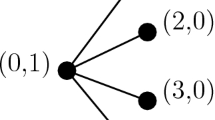Abstract
This paper continues the series of studies of Boolean polynomials (Zhegalkin polynomials or algebraic normal forms (ANFs)). The investigation of properties of Boolean polynomials is an important topic of discrete mathematics and combinatorial analysis. Theoretical results in this field have wide practical applications. For example, a number of popular public-key cryptosystems are based on Reed–Muller codes, and the representation of these codes, as well as encryption and decryption algorithms are based on Boolean polynomials. The spectral properties of such codes are determined by the number of zeros of Boolean polynomials and are analyzed using the randomization lemma. Since the problem of determining the number of zeros Zg of the Boolean polynomial g(x) is NP-hard, the algorithms taking into account the “combinatorial structure of the polynomial” (even though they are search algorithms) are of practical interest. In this paper, such an algorithm based on the properties of the monomial matrix is proposed. For various types of polynomials, exact formulas for the number of roots and the expectation of the number of roots are obtained. A subclass of Boolean polynomials consisting of polynomials with separating variables is considered. A result that can be considered as a generalization of the randomization lemma is proved. The theoretical results provide a basis for estimating the applicability of polynomials for solving various practical problems.
Similar content being viewed by others
REFERENCES
V. M. Sidelnikov, “A public-key cryptosystem based on binary Reed–Muller codes,” Discrete Math. Appl. 4 (3) (1994).
I. V. Chizhov and M. A. Borodin, “Vulnerability of the McEliece cryptosystem based on binary Reed–Muller codes,” Prikl. Diskretn. Mat., No. 6, 48–49 (2013).
F. J. MacWilliams and N. J. A. Sloane, The Theory of Error-Correcting Codes (North-Holland, Amsterdam, 1977).
V. K. Leont’ev, Combinatorics and Information. Part 1: Combinatorial Analysis, (Moskovskii Fiziko-tekhnicheskii Institut, Moscow, 2015) [in Russian].
V. K. Leont’ev and O. Moreno, “On the zeros of Boolean polynomials,” Comput. Math. Math. Phys. 38, 1542–1549 (1998).
V. K. Leont’ev, “Symmetric Boolean polynomials,” Comput. Math. Math. Phys. 50, 1447–1458 (2010).
Author information
Authors and Affiliations
Corresponding authors
Additional information
Translated by A. Klimontovich
Rights and permissions
About this article
Cite this article
Leont’ev, V.K., Gordeev, E.N. On the Number of Roots of Boolean Polynomials. Comput. Math. and Math. Phys. 58, 1188–1197 (2018). https://doi.org/10.1134/S0965542518070102
Received:
Published:
Issue Date:
DOI: https://doi.org/10.1134/S0965542518070102




